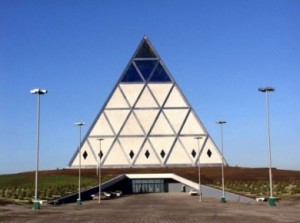ASTANA – A meeting of the Working Group of the Congress Secretariat and the 13th meeting of the Secretariat of the Congress of Leaders of World and Traditional Religions took place on Sept. 18 in Astana, where participants discussed organisational issues related to the upcoming fifth congress, which will be held on June 10-11, 2015.
 Kassym-Jomart Tokayev, Head of the Secretariat of the Congress of Leaders of World and Traditional Religions and Chairman of Kazakhstan’s Senate, noted that the meeting of the secretariat and the preparation for the fifth congress were being held at a moment of international tensions. Not only political issues, but also questions of intra-and inter-religious conflicts came up in the discussion. Referring to the spiritual goals of the forum, the head of the secretariat said that “the task of the upcoming congress is candid and effective discussion of the problems facing humanity, which is why the congress invited religious leaders and politicians to discuss the issues of dialogue.”
Kassym-Jomart Tokayev, Head of the Secretariat of the Congress of Leaders of World and Traditional Religions and Chairman of Kazakhstan’s Senate, noted that the meeting of the secretariat and the preparation for the fifth congress were being held at a moment of international tensions. Not only political issues, but also questions of intra-and inter-religious conflicts came up in the discussion. Referring to the spiritual goals of the forum, the head of the secretariat said that “the task of the upcoming congress is candid and effective discussion of the problems facing humanity, which is why the congress invited religious leaders and politicians to discuss the issues of dialogue.”
Addressing the participants of the meeting, Tokayev added,“As confessional guides, you are the keepers of moral and ethical values, influencing the minds and feelings of individuals and the society as a whole. You can inspire good deeds and accomplishments and help overcome the barriers of ignorance, fear and misunderstanding. In turn, policymakers are able both to implement the dreams and aspirations of the people to live in peace and realise the idea of the congress to promote mutual understanding, accord and cooperation among people of different confessions and nationalities. Together we can do much more than one at a time.” Following the official opening of the secretariat meeting, Tokayev had a number of bilateral meetings with congress representatives.
Initiated by President of Kazakhstan Nursultan Nazarbayev, the first Congress of Leaders of World and Traditional Religions was held Sept. 23-24, 2003, in Astana and attracted 17 delegations from 13 countries. The fourth congress, the most recent, was attended by more than 80 delegations from 50 countries. According to President Nazarbayev, “The congress in no small measure contributed to the fact that the world has not fallen into the abyss of the ‘clash of civilizations’.”
Building on the successes of the previous congresses, at the plenary session of the fourth congress, Nazarbayev proposed creating an online resource dedicated to the formation and strengthening of global tolerance and trust, which could become part of the umbrella electronic portal, G-Global.
The congress seeks to promote a global dialogue between religions and cultures as well as deepening and strengthening of mutual understanding and respect between religious communities. The congress aims to foster a culture of tolerance and mutual respect, as opposed to the ideology of hatred and extremism. As such, the congress seeks cooperation and collaboration with all international organisations and institutions aimed at promoting dialogue among religions, cultures and civilisations.
The main theme of the fifth congress will be “Dialogue of religious leaders and politicians in the name of peace and development.” Participants of the secretariat meeting designated focus areas of the breakout sessions for the upcoming congress, which include “Religious and political leaders: the responsibility to humanity;” “The influence of religion on young people: education, science, culture and the media;” “Religion and politics: new trends and prospects” and “Dialogue based on mutual respect and understanding between the leaders and followers of world and traditional religions for the sake of peace, security and harmony.”
According to tradition, fifth congress will bring together representatives of Islam, Christianity, Buddhism, Judaism, Taoism, Shintoism, Hinduism and Zoroastrianism, as well as senior representatives of international organisations such as the United Nations, the Organisation of Islamic Cooperation, UNESCO, the World Islamic League, the Alliance of Civilisations, Organisation for Security and Cooperation in Europe (OSCE) and others.
